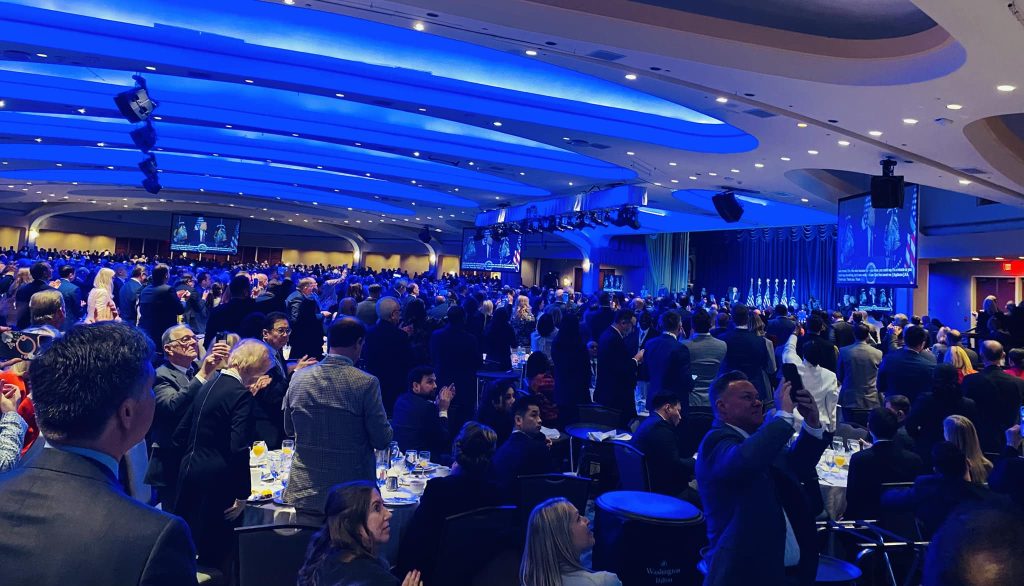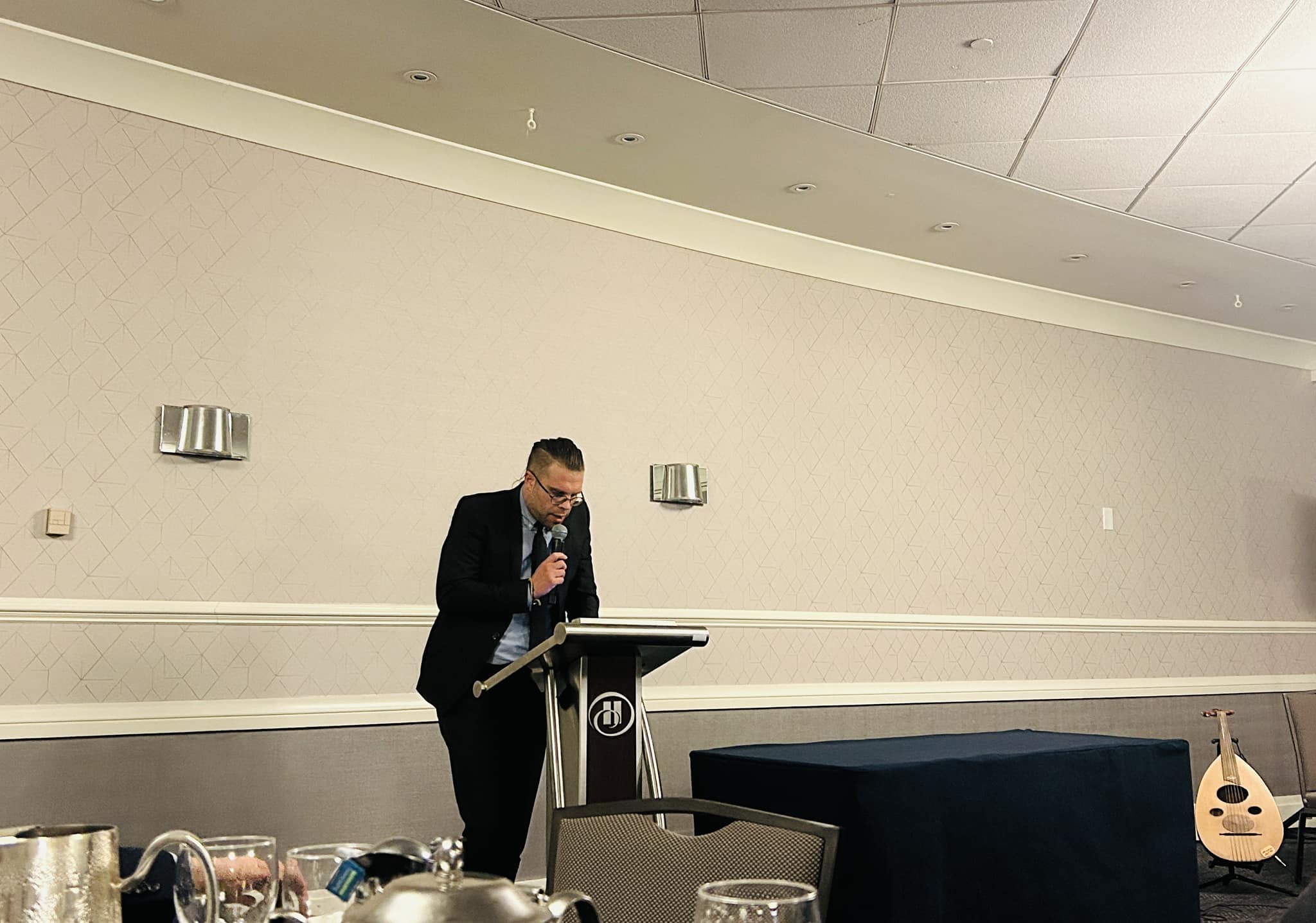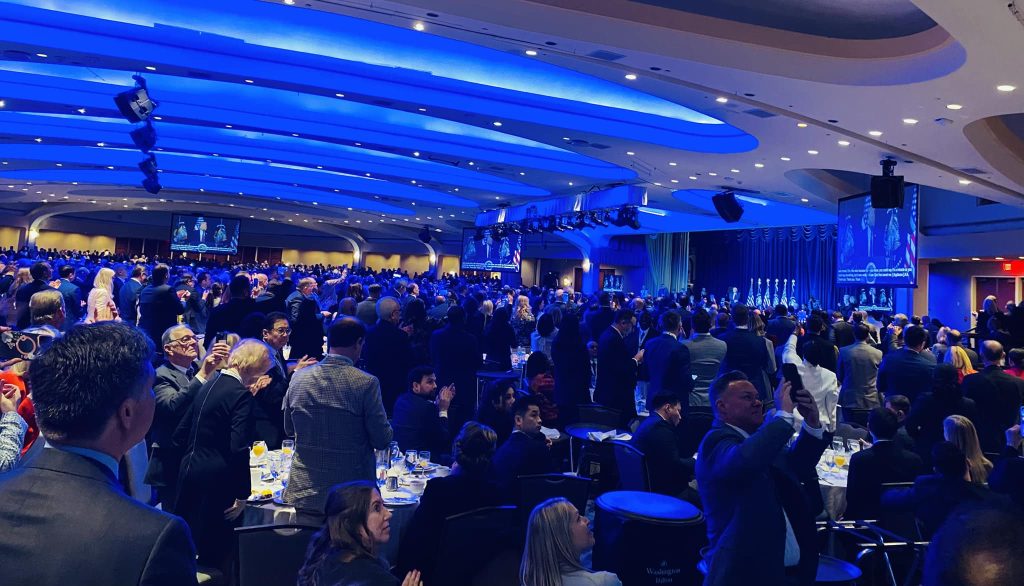Dear friends,
On February 6th, I was generously invited to attend the National Prayer Breakfast in Washington, DC and then to speak at the Middle East Dinner later that night. My speech was titled “The Jesus We Haven’t Heard Yet.”
The positive response to my message encouraged me. It has been shared over a thousand times on Facebook and watched over 3,500 on YouTube. Afterward, the respected spiritual director, Bill Hailey, wrote on his Substack, “Grief and love certainly are shot through Andrew’s address at the NPB, which he offered with great humility. I believe [his words] were given by God for him to say. In this way, Andrew’s words at the NPB are not just prophetic, they are important to hear and heed.”

After the main event on Thursday morning, I wrote a very critical post about what I had observed there. Following tradition, the president was the guest of honor and gave the final speech, which was interrupted with applause 24 times. (I analyze his speech and the audience’s enthusiastic response here.) “Jesus” was mentioned many times, though not by the president; he spoke about “Christianity” and “religion.” But, overall, what I observed was a deeply nationalist American Christianity with little real resemblance to Jesus.
When I got back to my room at the Hilton, one of my hosts asked me, “What’s your anger level on a scale of 1 to 10?” It was a wonderfully grounding question, and I paused to reflect on it before answering.
Then I responded, “I’d say my anger level is a 2. Yes, what we experienced is rightly angering. But I’ve slowly learned that cheerfulness is also the energy of prophetic witness. Overall, I feel cheerful.”
We had a sincere moment of laughter together, and then I spent the afternoon rewriting my speech for the Middle East dinner that night. I had a full speech prepared, but after the breakfast, I felt led to go in a different direction — to talk about the Jesus we hadn’t heard about yet at this National Prayer gathering.

After our dinner, I was invited to the podium and gave my speech about this Jesus. I spoke about the traumatized Jesus, the Jesus who loves the dehumanized target of genocide, the anti-nationalist Jesus, the truth-telling Jesus, the nonviolent Jesus, and the executed Jesus.
I was aware that my speech was very pointed, and I wasn’t sure how it would be received. But I felt at peace that this was the message I had been given to share. I did my best to deliver it in a spirit of tender honesty.
When I finished speaking, around fifteen Middle Eastern people came up to me and told me that it was “a healing balm” and “living water” for their grief. One man began to weep and said, “I am longing for Jesus! But I couldn’t find him here! I felt like I met Jesus again tonight!”
Later, a woman from Lebanon, who helped translate the Quran into English, told me that in Arabic there is an expression called “the touch of the prophet.” She gently touched her left arm with her right hand and said that it means that when you are touched by a prophet, you experience healing. She said, “Tonight I felt the touch of the prophet.”
I was deeply moved by these heartfelt expressions of gratitude and healing connection with Jesus amidst deep grief. Both Christians and Muslims articulated such a strong longing for the Jesus we meet in the Gospels. The viral response to my message online further indicates this longing.
The next day, I was standing in the hotel lobby, and an American man in a suit and tie approached me. He said that he had heard my speech, and I could tell he was angry.
He stepped closer to my face and told me, “It would have been better if you hadn’t angrily condemned others and actually spoken about Jesus! You didn’t even talk about Jesus! You should have talked about the Beatitudes!”
I took a breath and composed myself. Then I responded, “I wasn’t angry. And if you were listening, my entire talk was about Jesus. In fact, I mentioned every one of his Beatitudes.”
This man still insisted that he had listened to every word and that I was the angry one and that I hadn’t actually talked about Jesus. He said I should have focused on Jesus’ death and how God forgives perpetrators of violence.
Again, I took a breath and responded, “You are speaking bluntly to me, so allow me to speak bluntly to you. My talk ended by focusing precisely on Jesus’ execution and how God forgives all of us, including the perpetrators of violence. I am hearing a deep insecurity and anger in you that is fixated on a MAGA, Zionist Christianity. You didn’t hear what I actually said. The Prophet Isaiah said that a veil can cover our eyes and we can see but not perceive, hear but not understand. But disagreement is normal in a democratic society, and I welcome your feedback.”
The tone of our conversation shifted a little. He said that he had read my book Blessed Are the Others and really appreciated it. We thanked each other for sharing our views and said goodbye.
Looking back, I continue to be struck by this interaction. After my talk, several Middle Eastern people began to cry and said that they experienced a healing balm in my words about the Jesus they long for but we hear so little about. But this American man was infuriated and said that I hadn’t even talked about Jesus.
What a contrast: these people were at the same event and heard the same words, but they had a totally different experience. Some felt like they had been reintroduced to Jesus. Others felt like I hadn’t talked about Jesus at all.
At the end of my talk, I said the following:
“It’s nice to say the name “Jesus” and to gather in his “spirit.” But do we actually want the real Jesus? Or do we want a deep fake of Jesus that serves our exceptionalist, supremacist, Zionist agenda by dehumanizing others, justifying our violence, and calling this God’s will? It seems to me that many of us are addicted to the deep fake Jesus, the Jesus who dies for our sins and says “Blessed are the peacemakers” but leaves our nationalism, supremacist politics, and genocidal violence untouched.”
This is the sobering pattern I observe today. When many of us Christians hear about the real Jesus of the Gospels, we don’t even recognize him. We see but don’t perceive; we hear but don’t understand. Our religious and political loyalties become a blinding veil that blocks us from Jesus. As Miroslav Volf recently told my new initiative Prophetic: The Public Theology Fellowship,
“Jesus has become a moral stranger to us [Christians]. What mattered to him profoundly now matters to us marginally.”
At the end of my speech, I said, “I believe we need Jesus now more than ever. But we need the Jesus we haven’t heard much about at this gathering. We need the integrated survivor of trauma, the lover of the dehumanized and genocided, the anti-nationalist prophet, the public critic of predatory power, the pioneer of nonviolence, and the executed criminal who incarnates the unkillable love of God for all people.”
The signs of our times are troubling. May God help us to rediscover the real Jesus of the Gospels and to follow his Beatitudinal Way, come what may. This is the path of healing and hope for all of us.
You can listen to my speech here. If you want to go deeper, I warmly invite you to read my book Blessed Are the Others: Jesus’ Way in a Violent World.




